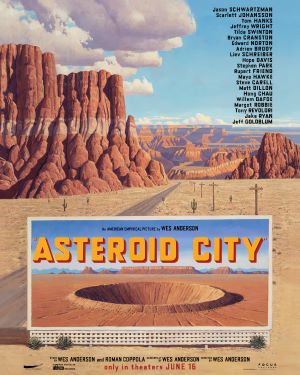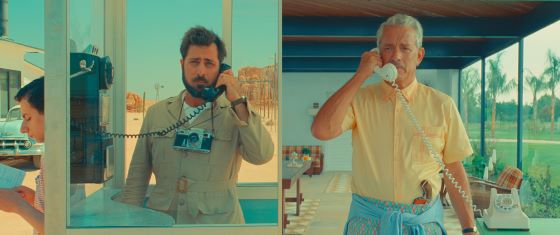

[Rating: Swiss Fist]
In Theaters Friday, June 23
A meta text in search of a story, Asteroid City is predictably heavy on style, surprisingly robust in substance, yet curiously short on structure and emotional impact. Blessed with a cast (and performances) that would make any filmmaker green with envy, the failings of the move lie entirely in the script, which flirt with the profound yet ultimately settle on the performative.
The baseline story deals with a collection of strangers that by chance or intention have gathered in a remote southwestern U.S. location called “Asteroid City,” which is hosting a Junior Stargazer’s Conference in 1955. This is what brings combat photographer Augie Steenbeck (Jason Schwartzman) to the remote location with his four children: the eldest of which, young teenager Woodrow (Jake Ryan), is there to collect an award. So too is the daughter of famous actress Midge Campbell (Scarlett Johansson), along with a collection of other kids and random outcasts peppering the camping court of the motor lodge that makes up the primary setting of the piece.
But that’s just what’s on the surface, here. That setting and group of characters exist within a television adaptation of a theatrical production, the former of which is introduced by a “Host” (Bryan Cranston) as the work of famed playwright Conrad Earp (Edward Norton). Writer/director Wes Anderson weaves the A-story of Augie, Midge, et al into a broader story about the play’s conception, and further still into the making of its TV adaptation. Resting at the heart of this narrative Russian nesting doll is the story of Augie’s attempt to reconcile his grief as a husband with his duties as a father while also learning to stand up to his recently-deceased wife’s dad (Tom Hanks), who shows up just in time to witness a U.F.O. encounter.

It’s a hell of a lot of story to squeeze into 104 minutes, and leaves little room for the metaphorical and thematic context that Anderson is trying to use as a buttress for all of this. Whether it’s the atomic testing taking place JUST over the horizon, the space-age vending machines, or the running gunplay that streaks through the motor court on occasion: there’s this sense that the future is on its way and not likely to wait. All of this is made literal with the arrival of an alien, whose appearance acts as the crescendo to the text and subtext of all this.
Complicating things further, there’s an interesting conversation taking place about how everyone is trying/struggling to write their version of the story unfolding around them. The audience sees this with Augie, who is careworn about how to break the news of his wife’s death to the kids, but also the schoolteacher (Maya Hawke) leading her class through daily lessons, her students revising the syllabus in real-time, the cowboys looking on, and even the alien whose appearance kicks up all the fuss. It’s no different for Conrad Earp, his actors, the stage director, and (obviously) the narrator, who is framing everything for audience consumption.
Anderson never corrals all of this in a way that connects with the characters and the stories they inhabit, though. To make matters worse, there is a lack of emotional heft in the back-half of Asteroid City: an affliction rarely diagnosed in the filmmaker’s oeuvre. Even some of Anderson’s thinnest efforts manage to pull off the seemingly impossible by connecting all the eccentricities of their characters, their adventures, and the settings in a moving moment of startling magic. Whether it’s the Jaguar Shark emerging from the darkness or Owen Wilson running from the police scored to “2000 Man,” Anderson always finds a way to tie together the visual with the emotional with JUST the right needle drop.

Well, ALMOST always…fans of the director’s work will search for that moment in vain, here, as Augie, Midge, Woodrow, Conrad, and co. never find that in Asteroid City (or the soundstage where the TV production is prepping for broadcast). There’s plenty of great set design, wardrobe, and acting on display, however, making the effort a fun outing for those that enjoy Anderson’s trademark aesthetic and acerbic wit. Johansson, Hawke, and Hanks are wonderful additions to company mainstays like Schwartzman and Norton, and all seem to be having a blast with the material.
The audience is deprived of this fun, however, and despite a few swings at the humorous and profound, they never get much of a taste of that, either. It’s easy to dismiss Anderson as a style-driven auteur more concerned with presentation than substance, yet that critique would be misguided, here, as one can see the outlines of something meaningful and earnest dancing along the edges of the frame. A tighter first act, less focus on the story outside of the story, and more integration of the thematic with the narrative could have made Asteroid City something special, yet one gets the sense that it needed more time in the oven. Like the celestial object that crashed into the eponymous city, this one burns bright for a moment only to settle into a lifeless monument to an idea more interesting than the reality.





Comments on this entry are closed.